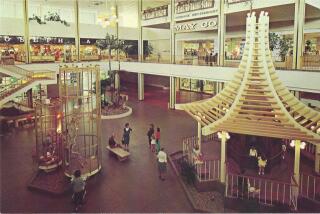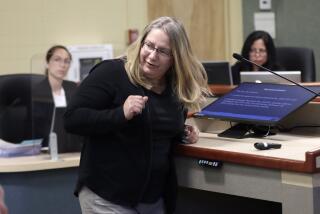Glendora OKs Funds for Freeway Auto Mall
- Share via
GLENDORA — The main street auto row is a dying breed. And unless city leaders want their tax base to suffer a similar fate, they must dig into their redevelopment coffers to catch what one official called “the wave of the future”--the freeway auto mall.
With that prophecy, proponents of the Glendora Auto Center won City Council approval last week of an agreement to build a 32-acre auto marketplace along the southern edge of the Foothill Freeway at the intersection of Allen and Lone Hill avenues.
Glendora will join nearby cities such as Monrovia, Duarte and Pomona in developing freeway auto malls in the hopes of capturing commuters’ attention and car-buying dollars with a wide assortment of different makes and price ranges of vehicles.
Under the agreement, the city’s Community Redevelopment Agency will pay an estimated $1 million to Auto Center Associates, made up of local developer Bill Bird and Glendora car dealers Fred and Carl Colley, to attract nine dealerships to the site. The pact was reached after 3 years of discussion and disappointment with private developers who were unable to make the venture a reality.
$2 Million in Revenue
Acting City Manager Art Cook said the auto mall, which will begin operation within 6 months, will eventually generate $2 million annually in additional sales tax revenue in addition to hundreds of jobs.
The revenue is sorely needed. In recent years, the city has lost two major components of its tax base with the closure of the Gemco department store and the collapse of Grand Chevrolet and Grand Motors in August amid financial and legal difficulties. Grand Chevrolet alone had reportedly accounted for one-third of the city’s $3 million annual sales tax revenue.
“This is probably one of the most important votes this council or any council has made in many years and will have a lasting, positive impact on the city,” Cook said.
Mayor Lois Shade and Councilman David S. Bodley cast the dissenting votes in the five-member council’s approval of the agreement last Tuesday.
Neither Shade nor Bodley dispute the economic benefits of an auto mall, but both questioned the fiscal responsibility of the current project, which calls for a total investment of more than $13 million in public funds.
The cost of the land to the city will be offset somewhat by “down payments” made by the dealers who purchase parcels in the center. The dealers will pay between $4 and $8 a square foot--about $175,000 to $350,000 an acre--for the land, which cost the city $12 a square foot to acquire.
Tax Increase
The city will pay off the remaining debt on the land through increased sales tax revenue. Cook estimated the city will be able to retire the debt within 7 years, though other auto center proponents believe it could take as long as 10 years to pay off the property. Bodley is even more pessimistic.
“I would imagine it could be somewhere around 14 or 15 years before we start to see money coming in,” Bodley said. “I think that’s an awful long time for a city to wait for the benefits of this type of arrangement. How do you survive in the meantime?”
Bodley noted that three of the six dealerships that have committed to move to the mall are already located in Glendora. The city, he argued, would be deprived of the revenue it already receives from these dealers until the debt on the auto mall property is paid off.
This argument was rejected as false by Councilman Bob Kuhn, one of the auto mall’s strongest backers. Kuhn said agreements with dealers will guarantee that the city will continue to receive the same level of tax revenue.
Incentives and Bonuses
For instance, Kuhn said, if a dealer typically generated $50,000 a year in revenue, the first $50,000 in sales tax from that dealer in the auto mall would go into the city’s general fund. Only revenue in excess of $50,000 would go to the redevelopment agency to pay off the debt on the auto mall.
“(Bodley) either was not aware of that or he ignored it,” Kuhn said.
Shade and Bodley are primarily concerned with what they believe to be an overly generous series of incentives and bonuses to be paid Auto Center Associates for finding dealerships to locate in the center.
These include:
A $50,000 signing bonus for committing to the agreement last week.
A $55,000 incentive payment for securing a commitment from the first of the nine dealerships.
A 10% “commission” on the dealers’ down payments, which will average around $650,000.
A $40,000 conveyance payment to be received for each dealership built in the mall.
A $40,000 incentive bonus if Auto Center Associates is able to attract a high-volume Honda, Nissan or Toyota dealership to the mall.
A $140,000 completion bonus if nine auto dealers have signed agreements to locate in the auto mall by June, 1991.
“I have no problem with providing an incentive payment to someone to attract dealers,” Shade said, “but we’ve got some big bucks going out the door.”
Bodley suggested that the council issue a new request for bids to see if it could get a better deal from a developer outside the city. But auto mall supporters say the city’s agreement with Auto Center Associates is considerably cheaper than an arrangement with an outside developer would be.
Time Element
“I doubt very much you’d get anybody else who’d do it for any less and provide you the six dealers right up front,” Cook said. “We want to get that developed and we want to get it generating sales tax.”
Kuhn argued that with neighboring cities pursuing auto mall projects, the city could not afford the time it would take to solicit new proposals from developers.
“If we hadn’t gone with Auto Center Associates now, I don’t think there ever would have been an auto center in Glendora,” he said. “The competition from the other communities was just too fierce.”
Kuhn added that a delay in developing the center would proably have led three dealers--Glendora Dodge, Colley Motors and Colley Ford--to leave town.
“The VW dealer had already told us that by April he’d be gone,” Kuhn said. “We would have no sales tax dollars for those two entities.”
Carl Colley, who with his brother Fred owns Colley Ford and Colley Motors, a Volkswagen and Subaru dealership, acknowledged that he and his brother might have moved their dealerships if efforts to build a Glendora auto mall stalled again.
“That was a possibility we were examining, not out of any malice of any sort,” Colley said. “We’ve been in Glendora for years, but when you’re looking at an investment of this magnitude, you have to explore all your options.”
The integral involvement of the Colley brothers in Auto Center Associates has raised questions of conflict of interest. Bodley noted that three dealers will be able to purchase their land for only $4 a square foot, while others will have to pay as much as $11 a square foot. The three paying the lowest rate are a BMW dealership, Colley Motors and Colley Ford.
“Talk about your conflict of interest,” Bodley said. “Of the three companies paying the least amount of money, two of them are owned by (the Colleys). I see a problem here.”
Cook said the varying down payments required of different dealers were based on the desirability of the dealership, as was the case with BMW, and the city’s confidence that the dealer would generate sufficient sales to pay off the balance of the debt on the property.
“We went over this at great length with our CRA attorney and he felt very comfortable with the fact that it was not a conflict of interest,” Cook said.
Kuhn dismissed the conflict of interest issue as “a red herring,” adding that developers in the past had been unable to persuade auto dealers to commit to moving to the center. “One of the big problems you had . . . was that they couldn’t talk to both the dealer and the developer worlds,” he said.
Carl Colley also deflected charges of conflict of interest by stressing the unique qualifications he and his brother have to attract fellow dealers.
“I would agree that to some degree there’s a conflict of interest, but I think it’s a positive impact on the project,” he said. “There was never anything hidden . . . Our strength is that we are car people. We know other dealers in our area and because we speak their language we probably have more clout to persuade them (to locate in the center).”
Colley said he expects his sales, which have averaged 550 new cars and trucks and 350 used vehicles a year, to increase by 50% to 75% once his dealership is settled in the auto center.
However, he said he does not anticipate the dramatic sales boosts experienced by the first dealers to locate in auto centers. While the freeway auto mall is the current wave in car retailing, he said the trend may already have reached its saturation point.
“Certainly, there’s a finite market out there,” he said. “There’s not enough room for every city that has freeway exposure to plan an auto mall. There aren’t enough dealers to go around. I don’t really think, from this point on, we’re going to see a continuance of the major growth in auto malls we’ve had in Southern California. I think we’ve pretty much peaked out.”






